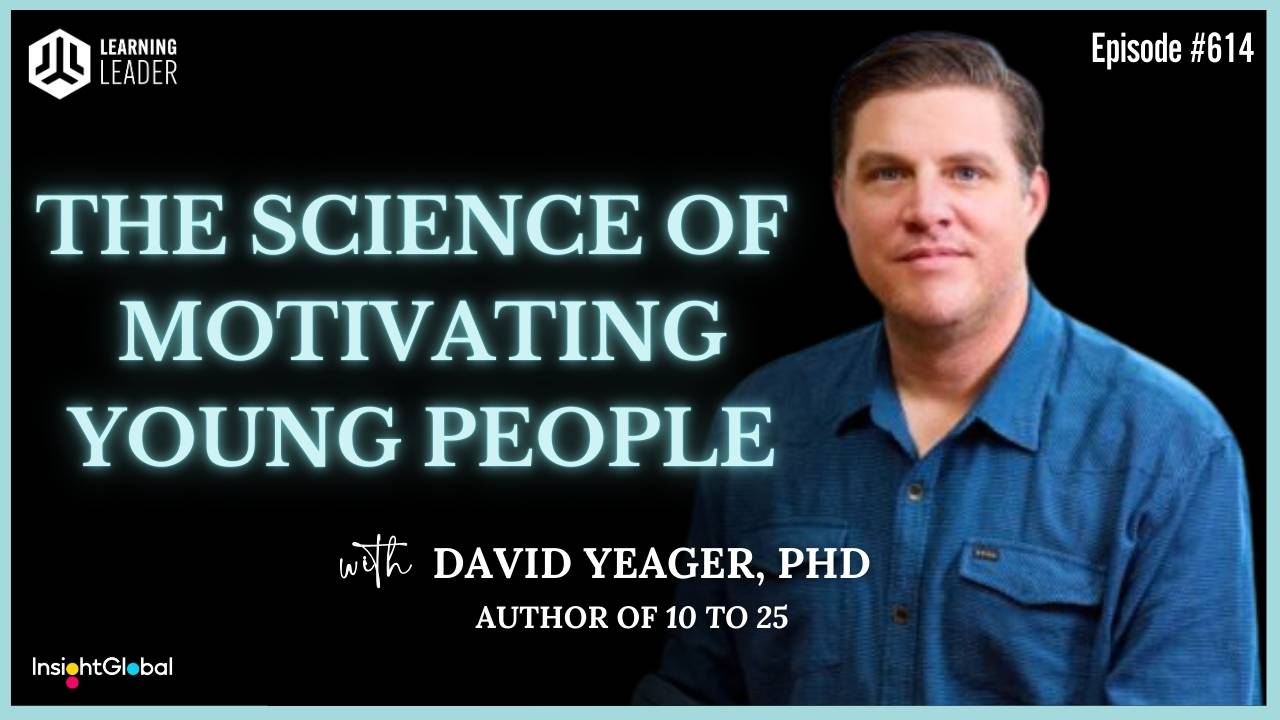David Yeager, PhD, is a professor of psychology at the University of Texas at Austin and the cofounder of the Texas Behavioral Science and Policy Institute. He is best known for his research conducted with Carol Dweck, Angela Duckworth, and Greg Walton on short but powerful interventions that influence behaviors such as motivation, engagement, stress, and more. He earned his PhD and MA at Stanford University and his BA and MEd at the University of Notre Dame. He’s the author of 10 to 25 – The Science of Motivating Young People: A Groundbreaking Approach to Leading the Next Generation—And Making Your Own Life Easier He lives in Austin, Texas, with his wife and their four children.
Watch this conversation on YouTube. And SUBSCRIBE!
This is brought to you by Insight Global. If you need to hire 1 person, hire a team of people, or transform your business through Talent or Technical Services, Insight Global’s team of 30,000 people around the world have the hustle and grit to deliver.
Order Our USA TODAY Best-Selling BOOK, The Score That Matters. “People spend far too much time obsessing about external scoreboards and not nearly enough time thinking about their internal one. Hawk and Cupps offer an important corrective, arguing the most important measure is whether or not you are living in alignment with your core values.” — Brad Stulberg, Best-Selling Author of Master of Change
Be part of “Mindful Monday” — Text Hawk to 66866
The Learning Leader Show
- The Pete and Leona story – What will people say about you at your funeral?
- “They changed my life and the lives of my entire family.”
- Tough love out of 100% care for you.
- Be tough AND supportive.
- Don’t lower your standards.
- High standards. High support.
- 10 to 25 – Find the right trigger for motivation. Find out what they care about. They need meaning and significance. They want status and earned respect.
- Are children less afraid of their parents now than they used to be? Dan Gilbert calls this the “illusion of moral decline.” It’s been happening for 75 years.
- The Parental Nagging Study – A common tactic adults use to get teens to “pay attention.” Research shows that nagging triggers the emotional part of a teen’s brain, shutting down their ability to think logically. They’re not ignoring you on purpose—they’re simply wired to tune out. A better way? Speak calmly and neutrally to engage the part of their brain that handles planning and decision-making. This opens the door to real conversation.
- Satya Nadella’s Model, Coach, Care philosophy at Microsoft. This is the opposite of Jack Welch’s rank and yank style at GE. Remember, the stack ranking methodology limited innovation and stopped people from taking any type of risk. We want to model the right behavior, coach others, and ensure they know we care for them so they feel the support they need to take risks, sometimes fail, get back up, and work to innovate.
- Theory X = Rank and yank. It stifled innovation for fear of failure and getting fired.
- Theory Y = No stack rankings. Built on connecting leaders with their people. Still high standards and demanding. Followed the “Model, Coach, Care” methodology. This is what’s happening today at Microsoft. Be a place where people want to work.
- The Mentor’s Dilemma – Stef Okamoto – honest, direct, and supportive.
- The “mentor’s dilemma” refers to the challenge of balancing honest, critical feedback to young people while still maintaining their motivation and self-esteem, as this age group can be particularly sensitive to perceived criticism and may easily feel discouraged or disrespected if not approached carefully; essentially, it’s the struggle between pushing someone to improve and potentially damaging their confidence by being too harsh.
- The mentor mindset: A mentor mindset can be adopted by using practices such as validating young people’s perspectives, asking them questions, and holding them to high standards.
- Questioning – Kate, a mom of two who lives in Chicago, whose oldest son was a sophomore came home one night from a party drunk and high. Kate responded with a combination of yelling and prosecuting… She instigated an interrogation and not a two-way conversation. Instead of interrogating, get curious. They had a reason for what they did. Figure out why. What’s your plan?
- Ask questions to get them to own their thinking and share it with you.
- Advice – Don’t accept some perceived path. Be reliable, show up, do the work, and ask for more work. Add surplus value. Whatever you’re being paid, focus on delivering 10x more value. Find a way to do that and your employer will beg to give you a raise and promote you.
- Apply to be in my Learning Leader Circle.
- Read: The Pursuit Of Excellence
- Read: Welcome to Management
- Be part of “Mindful Monday” — Text HAWK to 66866
- Connect with me on LinkedIn
- Join our Facebook Group: The Learning Leader Community
- To Follow Me on Twitter: @RyanHawk12
More Learning:
Episode 078: Kat Cole – From Hooters Waitress To President of Cinnabon
Episode 216: Jim Collins — How To Go From Good To Great
Episode #300: AJ & Keith Hawk – How To Instill Work Ethic & Curiosity In Your Children
Episode #303: General Stanley McChrystal – The New Definition Of Leadership
Time Stamps


Leave A Comment